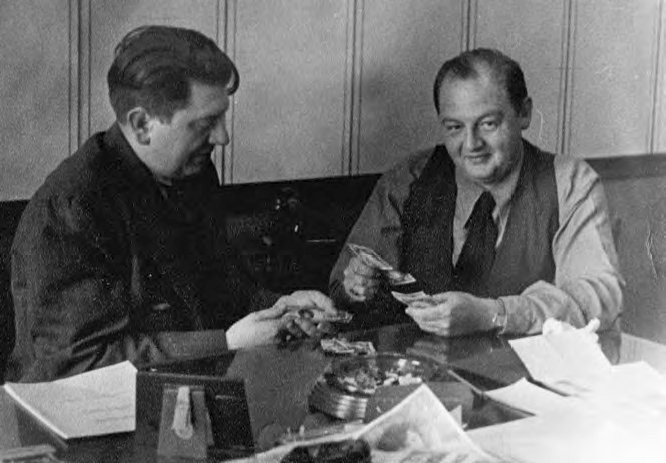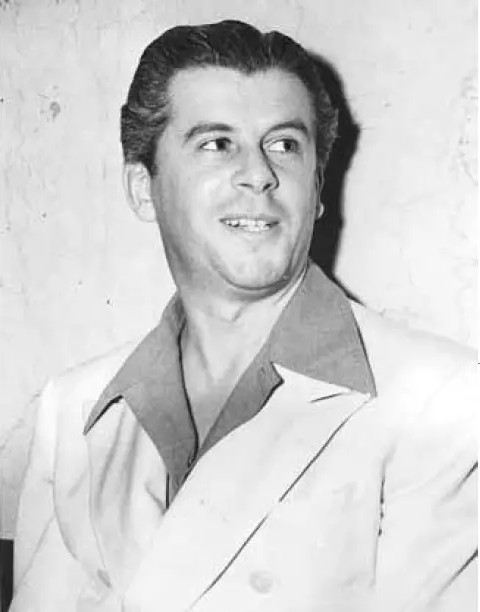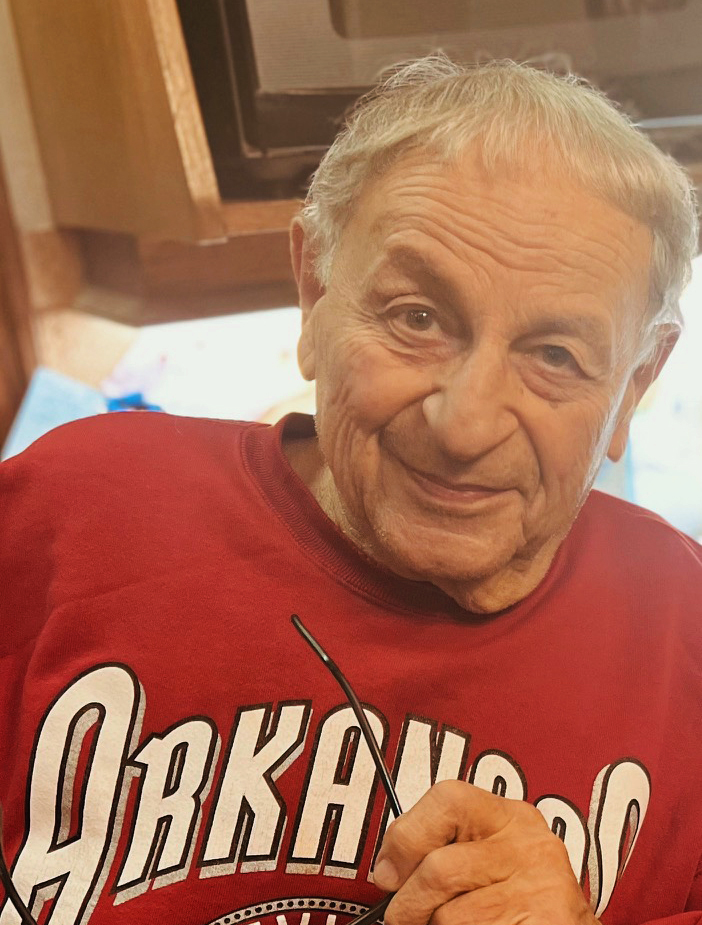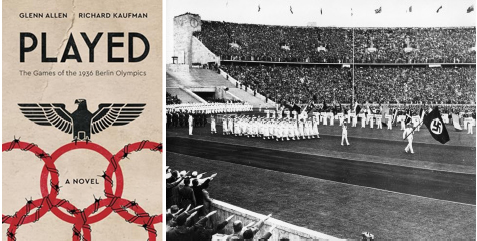Features
A deep dive into the lives of some shadier members of our community

By BERNIE BELLAN A few weeks ago I was contacted by a publicist for a publishing company, who asked me whether I’d be interested in obtaining a copy of a new book, titled Jukebox Empire: The Mob and the Dark Side of the American Dream?
Here’s what that publicist wrote: “This fall, Rowman & Littlefield is publishing a true crime book focusing on one of the key figures in the story of organized crime in the 20th century – Jukebox Empire: The Mob and the Dark Side of the American Dream by David Rabinovitch (publishing October 15). Rabinovitch, an award-winning filmmaker from Morden, Manitoba, unravels the story of his uncle William “Wolfe” Rabin, which takes him from the Canadian prairies to Chicago in the 1940s and Rabin’s invention of a jukebox. This is the first book to expose how organized crime infiltrated the jukebox industry and it’s an untold piece of criminal, cultural, and musical history. Rabin was the son of Jewish immigrants.

“Caught between the Mob and the feds in a plot to save the casinos in Havana from Castro’s revolution, Wolfe Rabin pulled the biggest money-laundering scheme in history, but his hubris led to the conspiracy falling apart in a sensational trial. At a time when there was a jukebox in every restaurant, diner, bar, barracks, arcade, and canteen, Rabin’s trajectory from inventor to promoter to outlaw is set against the Mob’s growing influence of the jukebox industry. In a world of music, machines, and money, popular culture and organized crime collide in this true story of invention and greed. Rabinovitch pieces together the puzzle that begins in Chicago and spans the casinos of Havana and the financial giants of Europe, leading to what the FBI called “the biggest bank robbery in the world.”
“Rabinovitch is a winner of Emmy, Peabody, and Gemini awards. His significant films include the documentary Politics of Poison and the mini-series Secret Files of the Inquisition. Jukebox Empire is his first book.”
Of course, the moment I read that email I was interested in reading the book. Here we have some of the essential elements of a story that’s perfect for this paper: A crime story with a Jewish character at its centre – who comes from Morden, Manitoba no less!
I immediately thought of historian Allan Levine, who’s written extensively about Jewish characters with sordid backgrounds – especially in the bootlegging business, and contacted Allan to ask him whether he’d ever heard of this “Wolfe Rabin?”
Allan said he hadn’t previously, not that is, until he was contacted by the author, David Rabinovitch, who asked Allan for some help.
After I began to read the book, however, I was again contacted by the publicist, who asked me to withhold writing a review of the book until October, when the book will be released to the public.
But, to whet readers’ appetites even further, here are some endorsements David Rabinovitch has already received in advance of the book’s actual release to the public:
“A fast-paced, colorful romp through a slice of the twentieth century American underworld”
-David Kertzer, Pulitzer Prize winner
“Jukebox Empire reads like a novel but the characters and events are real and chilling.”
-Peter Edwards, co-author, The Encyclopedia of Canadian Organized Crime
“It has everything: action, incredible characters, suspense, humor. Can’t wait to see the movie.”
-Fred Fuchs, producer, The Godfather, Part III
“A compelling story of family and crime that touches on key events of U.S. history in the 1950s and 60s”
-Scott M. Deitche, author, Garden State Gangland
“An eye-opening, informative, and fascinating book. Jukebox Empire is must-read.”
-Antonio Nicaso, author, Made Men, The Dark Mafia, Angels Mobsters & Narco-Terrorists
“A delightfully entertaining story of jukeboxes, money laundering, and stolen bonds.”
-Alex Hortis, author, The Mob and the City
“A unique combination of family memoir and investigative journalism.”
-Gary Jenkins, producer/host, “Gangland Wire”
“A tour-de-force account of the Mob’s growing infiltration into legitimate American industry and how it affected one man who was obsessed with power and money at all costs.”
-Joe Saltzman, Prof. of Journalism, Annenberg School of Communication, University of Southern California
I also asked David Rabinovitch whether readers could order Jukebox Empire in advance, so that they could obtain a copy as soon as it’s released.
David responded: The book “is available for pre-order online through the website www.jukeboxempire.com (Chapters Indigo in Canada) or readers should request it at their favourite bookstore.”

All this got me to thinking: Over the years, we’ve published quite a few stories about Jews with mob connections, and some of those individuals came from Winnipeg. Perhaps the story that elicited the most interest was one we published in 2015 by Martin Zeilig about a character by the name of Al Smiley. (You can still find that story on our website’s online archive. Just search for “Al Smiley.” in the “search archive” button on jewishpostandnews.ca)
Smiley, it turns out, was best friends with Bugsy Siegel (whose real name was Benjamin – and who hated being called “Bugsy.”) In fact, Smiley was sitting right beside Siegel – on his living room couch in his Las Vegas home, when Siegel was shot and killed by a Mafia hitman.
That story led to another story about a mobster with a Winnipeg connection who, it turns out, was actually related to me in a very distant way, someone by the name of Harry Altman.
In 2020 I wrote about someone by the name of John Novick in an article I wrote about the children of Jewish mobsters. In that same article I referenced Myer Lansky and his daughter, Sylvia, who was the subject of one of the greatest interviews Anna Maria Tremonti ever conducted when she was host of CBC’s “The Current.” (You can still listen to that interview on the CBC website.)
Finally, a few years back I happened to attend a Fringe show which was titled “Davey the Punk.” The creator of that show – and its sole performer, was singer Bob Bossin (who was a member of a well-known group called “String Band.”) The show was about Bob’s father, Davey Bossin who, while not a “made man” per se (Mafia parlance for someone who is accepted into the Mafia), but who was very “connected” and about whose background Bob Bossin knew nothing until years after his father had died.
What’s my obsession with mobsters, you might ask? Well, I don’t think I’m much different than a great many others when I say that I’m both fascinated and repelled by all these figures – and the fact they’re all Jewish only adds to my interest.
But, it got me to thinking – once again: Where are the stories about Winnipeg Jewish hoodlums from the North End? Even in Russ Gourluck’s masterful history of Winnipeg’s North End, The Mosaic Village, he only mentions two shady characters: Stanley Zedd, a well-known operator of gambling establishments, especially the Margaret Rose Tea Room on Osborne, and Bll Wolchuk, a major bootlegger in the 1920s.

So – to find out more about Jewish hoodlums of a bygone era, I turned to my most trusted source on the subject: Ernie Chisick, whom I first met at the Y reunion in 2019.
For those who don’t know Ernie – he is a raconteur of the first order and his own brushes with the law when he was younger only add to his mystique.
I sat down with Ernie one recent evening and asked him to repeat some of the fabulous stories he’s told me over the years about colourful North End characters with whom he crossed paths over the years. I was especially keen on hearing Ernie recite some of the nicknames of guys with whom he associated when he was younger.
The problem is, as Ernie explained, some of those individuals are still alive and, even if they’re not, they have kids and grandkids, so referring to them by their full names might not even be embarrassing, it might be potentially lethal for me!
I have attempted to reach out to one character in particular who, as Ernie described him, probably knows more about Jewish hoodlums… and criminals, from the North End of the 40s and 50s than anyone else alive, but even if that guy does get back to me, I rather doubt he’s going to want to see his name end up in the Jewish paper in Winnipeg. (I’m hoping that he will respond to my message and I’ll promise him full anonymity if he’s prepared to talk about his former friends – who weren’t quite boy scouts.)
Ernie though, has too many good stories not to at least refer to some of them here. He told me about a gambling club on Selkirk Avenue between Salter and Powers that was run by an individual who was known as “Montreal…..” (Again, I’m leaving out the surname because it’s a name that would be familiar to at least some readers.)
According to Ernie, that club had a lookout by the name of “Srulik Flaxman.” When Srulik would spot a cop coming, he would shout to the guys who were in the back room: “Watch out – it’s the football shoes kimmen!” (Why he referred to cops as “football shoes,” Ernie didn’t know.)
Here’s another story Ernie tells – about a character who went by the name “One-eyed Connolly.”
“They’re playing cards,” Ernie says, “and Connolly says he’s got to take a piss.” But before he gets up to go to the bathroom, he leaves his cards on the table, then takes out his glass eye, puts it on the table, and says to the eye: “Watch them guys; they’re all a bunch of thieves!” Apparently that so unnerved the other players, they sat there frozen in their seats, afraid of that well-known Jewish superstition: “the evil eye.” (But Connolly wasn’t Jewish. Can a non-Jew threaten someone Jewish with the “evil eye?” There’s a Saturday morning sermon for you, all you rabbis and would-be rabbis out there.)
With reference to Stanley Zedd and the Margaret Rose Tea Room, Ernie says that his father, Charlie, once said to him, “Take this to the Rosie (the nickname for the Osborne Tea Room) and ask for Stanley Zedd.” Charlie handed Ernie a paper bag (which, Ernie now says, unbeknownst to him at the time, contained betting slips. Ernie claims he was only an innocent 16-year-old. not yet wise in the ways of the world. Anyway, the statute of limitations protects him now.)
So, Ernie drove to the Tea Room and announced, when he walked into the room, “I have something for Stanley from Charlie.”
He was ushered into the back room where Stanley Zedd held court. “He was very nice to me and told me my father was an honourable man,” Ernie recalls.
Another time, Ernie says, he got a phone call from his father in the middle of the night.
“Charlie,” Ernie asked (Ernie says he always called his father by his first name), “what is it?”
“I’m in jail,” Charlie responded. (He didn’t say why.)
“In the morning,” Charlie continued, “give Roland Penner a phone call.” (Roland Penner would go on to become Manitoba’s attorney general, but at the time he was in partnership with Joe Zuken in the firm, Zuken and Penner.)
“So, I phoned Roland Penner’s office in the morning. I told his secretary who I was and she put me through immediately to Roland Penner.”
“Roland says to me, ‘You heard from your dad? The mounties made a raid in the middle of the night. Eighteen guys (from different cities) were charged with conspiracy to commit bookmaking.’”
“Roland says: ‘I’ve got something for you.’ “ He explained that the mounties took Charlie out in the middle of the night and it was quite cold.
“Your father wanted me to give you his gloves,” Penner continues.
“I put them on,” Ernie says, “and I feel a lump in one of the gloves. They were betting slips that could have been used as evidence in court.’
(Did Penner know that, I wonder? Ernie says he doesn’t know.)
“All the guys were taken to a lock-up in Calgary. Harry Walsh represented the three Winnipeggers,” Ernie continues.
“My dad explained that the Jewish boys were able to get kosher food to eat because one of the mounties was Jewish and he brought them deli.”
The Grey Cup was being held that week, Ernie says. “Charlie said he made $10,000 taking bets on the game” – while he was in jail.
Eventually, when the accused were brought to trial, they were all acquitted, Ernie explains.
“Walsh said they weren’t betting with each other; they weren’t in business together.” As a result, the conspiracy charge didn’t hold up, Ernie says. (If they had simply been charged with bookmaking, then the likelihood is that at least some of them, including Charlie, would have been found guilty.)
I don’t necessarily approve of Charlie’s behaviour. Rather, the stories about the less savoury aspects of Jewish lives don’t usually receive much attention in North American Jewish newspapers. (Some Israeli newspapers, in contrast, are not at all reluctant to publish extensive investigative pieces about the Israeli underword.)Yet, there are so many colourful stories to tell I thought I’d deviate from the Gerry Posner and Myron Love types of stories that extol the virtues of individuals who have led honest, hardworking lives to write about other less honourable fellows who, as the late Harvey Rosen used to say are “of the Hebraic persuasion.”
We’ll have more about members of our community who had connections to activities that were not always on the right side of the law in our Aug. 16 issue. If you might have a story to add about a relative with a shady past that you might like to share, you can email us at jewishp@mymts.net
Features
What Does The Future of Online Betting Look Like For Canadians?

There have been plenty of positive developments recently in how Canadians can place bets online. A major boost to the Canadian online gambling industry came when Ontario opened its doors to private companies. What further changes lie ahead in the future?
The expansion in Ontario has produced massive revenues for the Canadian gambling industry. Allowing private companies to operate in the province has given gamblers far more choice and they have been flocking to the new sites now available. Great news of course for gamblers and betting companies but also for the taxman. As has been seen in the USA, making gambling legal (especially on sport) has brought in billions of dollars of tax revenue. Canada is now also reaping the benefits and will continue to do so in the future.
The industry was also changed when in 2021 it finally became possible to place single-event bets on sport. Until then it had to be parlays or as they’re also known, accumulators. Both of these changes have seen a great improvement in the online Canadian gambling industry. 2024 has already been a profitable year for the online betting industry in Canada. The first quarter of the 2024-2025 fiscal year certainly illustrated that. The total amount wagered was $18.4 billion and that was 31% higher than the results for the same period in the previous fiscal year.
Revenue in Ontario for the period April 1 to June 30 was $726 million. That’s from the 50 operators who have 80 gaming sites in the province. The total is 34% higher than in the same period in 2023 and 5.2% higher than the previous quarter. With the expansion in Ontario being so successful, the question now is whether other provinces will follow suit. It seems that opening up their gambling industry to private operators may well be the way forward. However, it is recognised that if this is to happen, it must be done safely. Wherever there is legal online betting, it seems that regulation is not too far away. It’s accepted that there is the need for some regulation. Protecting players is vital and with companies required to be licensed, this helps control them. Those who bet at unlicensed sites do not have anywhere near the same level of customer protection and are at risk of online fraud.
There have already been signs of increased regulation of the Canadian online betting industry. How gambling is advertised is always a thorny subject whatever the country. This year has seen the use of celebrities or sports stars in gambling related advertisements prohibited. A key reason for this is to protect youngsters who may be attracted to the industry. Studies have shown that youngsters can identify gambling brands more than they do those for tobacco or alcohol.
It’s also likely that there will be more betting on esports in the future. There has been an increase in the amount of coverage given to them by online betting sites. This was particularly seen during the COVID-19 pandemic when many sports events were canceled. Esports continued and sites such as PowerPlay began to give them increased levels of coverage and will continue to do so.
Technology plays an important role in the gambling industry. Those who love to go online and place bets will see technology producing even more changes in the future.
Banking is an important element of online betting. Improvements in technology in this area have made it far easier to place bets online. Improved encrypting of data and more use of cryptocurrencies also makes it safer when it comes to online financial transactions. Again, this will attract even more gamblers to the industry.
As for the games that are played, particularly when it comes to online casinos, huge strides are taking place. Virtual Reality (VR) and Augmented Reality (AR) are the way ahead, so expect to see more Canadian gamblers wearing VR headsets as time goes by.
The graphics seen in games are already staggering but they will get even better in the future. Putting on your VR headset will see players transported into other worlds and even forwards or backwards in time. Those who love to play at live casinos will be in for a treat. Using their headset, it can appear they are playing at one of the most famous casinos in the world, rather than on their settee.
AI is loved by many but hated by some. It will also have a huge influence on the Canadian online betting industry in the future. This won’t just be in creating games but also be used to deal with customers. AI has the ability to gauge the behavior of gamblers and identify if there is a possible need to help them if spending too much or betting for too long.
Mobile phone technology continues to make advancements. Rather than just playing on your laptop at home, many players download apps and try their luck on their mobile devices. Further advancements are fully expected in the future.
The future of online betting in Canada does look a rosy one. The amount earned by betting companies is expected to increase and that will be good news for those who receive tax revenue. Players will likely have more sites to bet on if other provinces follow in the footsteps of Ontario. The games that will be available will be even more thrilling to play and becoming a member of a site will be safer.
Features
New book chronicles what were arguably the most important – and controversial Olympic Games in history

Review by BERNIE BELLAN With the 33rd Summer Olympics set to take place in Paris from July 26 to August 11, I thought it an opportune time to tell readers about a book that was released earlier this year and which provides a sweeping view of what were arguably the most controversial Olympic Games ever held – the 1936 Summer Olympics in Berlin, Germany.
Written by two writers, Glenn Allen and Richard Kaufman, who have spent most of their careers writing and producing films, PLAYED: The Games of the 1936 Berlin Olympics combines fiction and non-fiction in a thrilling, yet somewhat confusing manner.
Although Jewish readers are likely to find themselves focused on the rampant antisemitism that pervaded the games – given the determination of Hitler to use the Olympic Games as a masterful propaganda tool, this book is sure to appeal both to fans of the Olympic Games and students of history.
There are many heroes mentioned throughout “PLAYED,” including such well known names as Jesse Owens, who embarrassed Hitler to no end by winning what was then a record four Gold medals in various track events. But there were many other heroes as well, especially Alan Gould, who was the Associated Press Sports Editor, and who wrote many columns calling for a boycott of the games; and William Dodd, the US Ambassador to Germany from 1932-1937, who was warning of the dangers posed by the Nazi threat long before it became all too apparent to politicians, including President Franklin Roosevelt – who adopts quite a sanguine attitude toward the Nazi threat in this book.
And then there are the villains, chief among whom was the despicable Avery Brundage, President of the American Olympic Committee, who was determined to be appointed to the International Olympic Committee (of which he was later to become its president, from 1952-72). It is no coincidence that it was Brundage who was not only the key figure in overcoming resistance to the notion of the US boycotting the 1936 games, it was Brundage who was also central to the 1972 Munich Olympics carrying on even after the massacre of 11 Israeli athletes.
I admit that I knew quite a bit about Brundage’s unsavoury reputation even before reading this book, but the degree to which he connived to make sure America would be represented at the games when there was fierce opposition to exactly that position from many of the leading figures in the sports world in the US at the time is truly shocking.
But, while the historical record provides ample evidence of the extent to which Hitler and his henchmen were determined to use the Olympics as a showcase for Nazi superiority, while reading this book I couldn’t help but wonder just how much fiction was mixed with fact.
In the press release I was sent about the book, it was noted that “Based on real stories and real people involved in the 1936 Berlin Olympics, PLAYED plunges readers into a compelling, fictionalized account of the insanity and hysteria that unfolded across Germany, the United States and in much of the world from 1931 through 1936.”
I couldn’t help myself from questioning: Just how much is fact and how much is fiction in this book? Of course, given that the authors use their imaginations to conjure up the dialogue in the book, I kept thinking to myself – especially as I was reading about how sexually aggressive many of the female characters in this book were: Is this a case of two screenwriters using their past experiences writing movie scripts as an excuse to infuse something that might be passed off as a largely historical account with a great big dollop of licentiousness in order to attract readers?
Two of the major female characters: Martha Dodd, daughter of US Ambassador Dodd, and Eleanor Holm, a champion US swimmer, certainly led carefree sex lives – at least if you were to believe the accounts given in this book. Dodd, in particular, is such a fascinating character, because not only was she quite willing to go to bed with many Nazis (and it seemed – anyone who asked her), including Ernst “Putzi” Hanfstatengel, described as Hitler’s henchman – who would eagerly dispatch anyone Hitler wanted rid of, in time Martha Dodd ended up in the arms of a Russian spy – who himself was ordered executed by Stalin.
As for Holm, even though she was a champion in the swimming pool (in backstroke events), she hardly led a disciplined life as an athlete. In PLAYED, at least, she is one hell of a “player” – and this was well after she was married!
Unfortunately for Holm, however, one man who lusted after her – and whom she detested, was Avery Brundage. Now, I did try to find out whether the account given by Kaufman and Allen of what happened between Holm and Brundage when they were both on the same ship headed to the Berlin Olympics with the entire American team of athletes and officials, was in any way true. (In the book, Brundage attempts to rape Holm, but given her athleticism, she manages to deliver a solid kick to his nether regions – leaving him writhing in pain. The next day, he decides to kick her off the US Olympic team.) According to Holm’s own account, however, the reasons for her being booted off the team had to do with her not wanting to go to bed when she was told to do so. (I much prefer the PLAYED version – and if they ever make a movie from the book, I’m sure audiences would be much more interested in watching Holm do to Avery Brundage what a lot of women would probably fantasize about doing to men.)
Of course, the parts of the book describing some of the leading Nazis, including Hitler himself, along with Joseph Goebbels and Herman Goering, are luridly detailed – as one would expect any description of them to be, but one character who comes off quite favourably – much to my shock, is Leni Riefenstahl, the famed German filmmaker, who had already established a notorious reputation as a propagandist in her famous documentary about the 1934 Nuremburg Rally, “Triump of the Will.”
Rather than painting her as a tool of the Nazis though, the authors offer quite a sympathetic – even admiring portrait of someone who was wedded to her craft. According to this book, Riefenstahl actually fell in love with a member of the US Olympic team by the name of Glenn Morris, who goes on to win Gold in the decathlon competition. (Again, however, there is one unforgettable scene where Morris, after winning his medal, runs over to Riefenstahl, rips off her blouse, and kisses her breast. Is this a Hollywood screenwriter’s fantasy? Who knows?)
There are also many stories of Jewish athletes in this book – some of which are tragic. The female high jump champion in Germany at the time was someone by the name of Gretel Bergmann. Bergmann had gone to England prior to the Olympics knowing full well that she would not be allowed to compete for Nazi Germany. In the book, Putzi goes over to England and threatens Bergmann that she will have to return to compete for Germany, otherwise her family – who had still remained in Germany, will face severe consequences. When Bergmann reluctantly returns to Germany, Brundage points to her becoming part of the German Olympic team as a sign that the Nazis have softened their stance toward Jews, but once the American do agree to participate and cross the ocean to Germany, Bergmann develops a mysterious “injury” that prevents her from actually being part of the German team.
The book is full of such stories – so many, in fact, that your head will be spinning trying to keep track of all the characters mentioned in the book.
Still, if you want to enjoy a rollicking read that may or may not have many parts that are wholly concocted from the writers’ imaginations even though they’re writing about actual events, then you might want to give PLAYED a shot.
As for this year’s version of the Olympics, while there isn’t nearly the same dramatic tension surrounding them as there was prior to and during the 1936 Berlin Olympics, the cheating, skullduggery, and propaganda that permeated the 1936 games has forever tarnished the reputation of the Olympic Games and, while it’s a different type of antisemitism that we’re seeing on the world stage these days, we’re all holding our collective breaths wondering how Israeli athletes are going to be treated in Paris – the same way Jews were wondering how Jewish athletes were going to be treated in Nazi Germany in 1936.
PLAYED: The Games of the 1936 Berlin Olympics
Published 2024 by WordServe Publishing
419 pages
Features
Canada’s favorite online casino games

The people of Canada sure love to play casino games. Gaming and placing bets is a popular pastime in the country with 76 percent reporting that they have participated in at least one form of gambling within the last year. In recent years, the online industry has seen a significant boost as players look to play at the best Canadian online casinos as more provinces look to remove prohibitive legislation.
We take a deep dive into the current legal situation for both online and offline casino gaming in the country, in addition to which casino games are the most popular and what there is to love about them, as well as what the future of the Canada’s online casino landscape could look like.
Both online and offline casino gaming is popular. When playing games online, players look for convenience, security and a good variety in bet and game choices. When going to a land-based gambling venue, they look for a comprehensive entertainment experience, they expect a trip to a casino to be an exciting day out.
The laws in Canada are complex in regards to what types of gambling are legalized and how it is regulated.
The lowdown on gambling laws in Canada – online and offline
Under federal law in Canada, technically the provision of all gambling related services is prohibited. However, exceptions are applied when it is regulated at a local or provincial level.
Each province has the responsibility of regulating and creating laws that concern all types of gambling within them. If they chose to do so then they can provide licenses, manage revenue distribution and set their own age restrictions. Most provinces in Canada have now legalized gambling in some form, with some areas having a more prohibitive approach than others.
For example, Ontario is probably the least restrictive and there are a number of land based casinos venues here open to residents and tourists. Also, there has been a recent introduction of iGaming in the province too.
There are now more provinces looking to follow in Ontario’s footsteps with Alberta looking at taking a less restrictive stance. Currently, charities and religious organizations are allowed to register as gambling providers. There is also an online gambling site based in Alberta that is regulated.
In Canada, the Criminal Code does not actually make specific reference to online gambling activity, which has left it open somewhat to interpretation. The federal government itself has not created any laws specific to online casinos, some provinces are now establishing their own regulations. Also, online casinos and other gambling sites that are operated outside of the country are accessible to people within Canada.
There are a few casino games that are particularly popular in Canada
Slots
From electronic machines to table games, Canadian’s love all types of casino activities. Slots and online slots are one of the top games enjoyed in the country. One reason that people love slots is due to their simplicity, there are no complex rules to get to grips with.
Online games and offline slots are very similar, however online games tend to have more special features and bonus rounds. You might also find that the minimum bet amounts are lower. Slots come in all kinds of themes, from movie themed games to those inspired by ancient Egypt and the pharaohs, there are thousands to choose from online.
Poker
Another well-loved casino game in Canada is poker, a game that has been around for hundreds of years and can also be played online. Poker is a bit more complex and requires patience in order to develop the necessary skills and strategy to be confident when playing the game.
Texas Hold’em is the most common variant of the game in this region, although three card poker, omaha and seven card stud are just some examples of the other types of poker enjoyed here.
Roulette
Roulette is also a top game for Canadian casino enthusiasts. The three main variants are American, European and French, with the American roulette game being the most widely recognized across Canada. Each variation has a slightly different format and house edge as well as different betting options.
Blackjack
Blackjack, also known here as 21, is a top card game. The player is playing against the dealer and to win they must try to get to 21, or as close as possible, before the dealer does.
The future of online casinos in Canada
As casino related legalization across Canada becomes less restrictive and more online operators set up in the region, we can expect this industry to flourish in the years ahead. Player numbers are likely to continue to grow and new technologies like AI will further improve and personalize the experiences users have on gaming sites.



